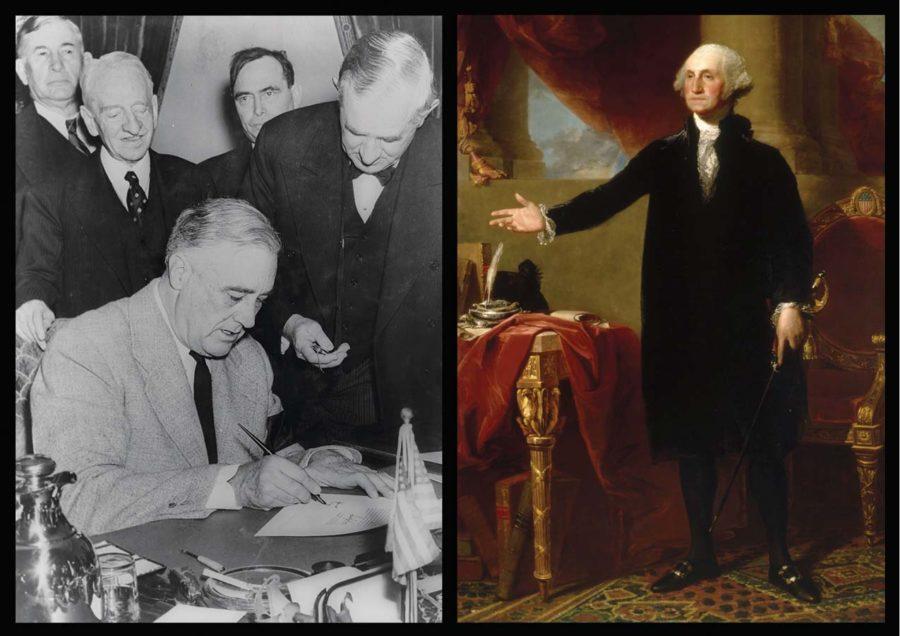Belding: Terms limits may be necessary to preserve working Constitution
October 3, 2011
American politics today does not comport with the vision of the writers of our Declaration of Independence and Constitution and the fighters of our Revolutionary War. Political careerism was never part of our constitutional tradition. While our political system allows for unlimited elections to the House of Representatives, Senate and presidency, ideally office-holding would rotate more freely than it does.
That is the ideal with which the Founders constructed their republic. That ideal comports with political thought as ancient as Aristotle.
In supposing that American citizens would remain tuned in to current events, they supposed that some of those citizens would gain office. Instead, careerism has proliferated as we have removed restrictions on voting rights based on property, gender and age. And while the people should have the opportunity to re-elect effective politicians, they should not do so at the expense of new bodies with new, beneficial ideas. Change should be slow and not disturb our foundations, but it should come around eventually.
There are 435 members of the United States House of Representatives. Fifteen of those were elected before 1980. Thirty-five of those members were elected from 1980 to 1990. One hundred nine Representatives were elected in the 1990s. More than one-third of our current representatives have been in office for more than a decade. That’s with elections every two years. From a practical standpoint, we cannot avoid having politicians who hold office for many years without interruption.
And with media outlets increasingly centralized, there’s not much room for individual citizens to participate individually in politics. Large blocs of voters vote whichever way Bill O’Reilly or Chris Matthews or Rachel Maddow instruct them. Aside from our wholesale willingness to check out of political awareness and freethinking, most of us are unable to devote the time we need to carefully consider who is the best candidate for office and which way we should vote on ballot initiatives. In a world of wage labor and salaries, time is money, and we just don’t have enough spare time to be conscious of our political surroundings. Most American households support their middle-class standards of living with two incomes; leisure time exists only for the wealthier parts of society.
Consider now a more intellectual argument: Holding office for long periods of time is inconsistent with the very idea of a republic. A republic is a government that exists for the benefit of the common spaces between citizens, not for whichever party currently holds office. Party affiliations and factional alignments should be incidental labels of convenience, not determinants of what the legislative session’s political action will be.
Republicans (as in the GOP) are supposed to govern in the interest of everyone in the United States, not their base of socially conservative, wealthy, Christian voters. Democrats also are supposed to govern in everyone’s shared interest, not merely their base of poor, working-class, minorities or well-educated professionals.
The leading principle in a republic is that everyone will have a chance not only to cast a vote, but to hold office and take a turn at the helm of the ship of state. Aristotle wrote in his study of The Politics that the state’s purpose is “for the sake of a good life.” The object toward which government action and policy should be directed, he wrote in the same work, is “the salvation of the community.”
He then went on to define citizenship. In the ancient Greek world, women, children and slaves were not citizens. It is only in the wake of the Enlightenment and the French Revolution of 1789 that citizenship has been bestowed upon individuals as a reward simply for their existence. In contrast to today’s practice, where citizenship is bestowed, not earned, citizenship in Aristotle’s Greece had to be worked for.
A citizen is one who “shares in the administration of justice, and in offices.” To the extent that we participate in politics, we are citizens. We earn that distinction only by participation.
We should adjust our Constitution to the norms of life in 2011 and consider term limits on offices. Incumbents are increasingly entrenched and resistant to electoral challenges. In the face of those practical conditions, constitutional changes are necessary whether we like it or not.







